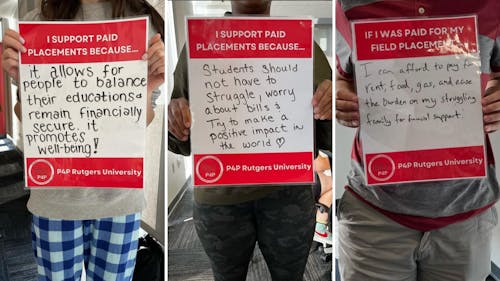Rutgers P4P advocates for reimbursement, compensation for mandatory social work internships

Payments for Placements (P4P) is a nationwide student-led union advocating for students in the field of social work to be fairly compensated for completing internships that are required for them to graduate.
The Daily Targum recently met with members of the Rutgers P4P chapter to discuss the purpose of placements, the challenges social work students face in being paid for completing them and the implications the current placement system has for their mental and physical well-being.
Claire Thompson, a Rutgers School of Social Work graduate student, said during their undergraduate senior year and graduate schooling, social work students must complete extensive hours of unpaid labor, often at agencies outside of the University.
They must work 400 hours by the end of their undergraduate senior year, 15 hours per week during their first year of graduate school and 22.5 hours per week during their second year.
This workload is exacerbated at Rutgers, where Thompson said students must complete 1,125 hours of work to qualify for the social work licensing exam, which is 225 hours more than the average national requirement.
She said while she understands how requiring more hours can bolster Rutgers' reputation and better equip students to enter the workforce, not being compensated for work that can take up three full workdays every week can be challenging.
Thompson said the tasks social work students complete in these roles are comparable to those of full-time employees, yet they receive no wages, stipends and, sometimes, even no reimbursement for extensive commutes to their worksites.
Moreover, social work students have to pay charges for their work when receiving academic credit for it, she said. Those costs increase as students transition from their undergraduate to graduate programs.
"We get three credits per semester for this internship," Thompson said. "So, actually, even more so than not being paid, we are paying for this experience by paying for the credit. We're paying to work for free."
She said that working these hours without pay burdens the mental, physical and academic welfare of social work students, who often have to balance other sources of income alongside their academic course load and internships.
She said she knows students who need to go into debt or rely on others, work overnight and weekend shifts or, conversely, pursue night classes to work during the day to pursue their degrees.
"It's harder now than ever to keep up with the cost of living and just the demands of life," she said. "And so, for a lot of us, we've taken out big loans, or gone into a lot of credit card debt (or) relied on family members for extra support."
The lack of compensation early into their careers often contributes to burnout and dissuades social work students from formally entering the field, Thompson said. Many students begin to reconsider whether they are willing to work such substantial hours for little pay.
She said as of now, the chapter is working to obtain funding through the University's endowment fund, external grant-giving agencies and the companies who offer these placements. It has received support from the Rutgers American Association of University Professors and American Federation of Teachers (AAUP-AFT) and certain School of Social Work professors.
Thompson said the organization also plans to meet with administrators to discuss students' needs. Should their needs be denied, the group would consider leading a walkout to advocate for them.
The chapter is asking the student body to sign and circulate a petition demanding the University recompense students in the department for their work, as it plans to leverage this support into advocating for their demands.
"Our petition has (606) signatures so far in support (of) the movement," Thompson said. "Also, just ... keep talking about it. If you know a person in the social work program, ask them how they're doing with it or just provide some sort of validation and empathy for the struggle that we're going through."



